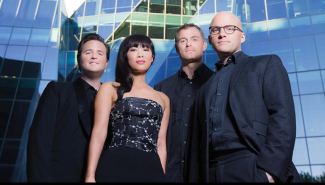Concert Review: Sir András Schiff / Musica Viva

Sir András Schiff
Musica Viva,
Concert Hall, Sydney Opera House,
23 October 2018
Sir András Schiff’s Gala Piano Recital for Musica Viva, was a deeply satisfying evening of music. Returning to Australia after two decades, the Hungarian born British pianist performed from the repertoire for which he is renowned. At the centre of his programme, he explained, were the Three Intermezzi, opus 117 by Brahms. Surrounding this, Sir András curated a collection of works by composers whom Brahms “knew, loved and admired.”
Opening the evening was Schumann’s final opus, Theme and Variations in E flat major WoO 24 “Ghost Variations” his swansong, whose composition was interrupted by an attempted suicide, after which Schumann completed the final two of five variations. Sir András included Mozart’s Rondo in A minor, K 511, J S Bach’s Prelude and Fugue no 24 in B minor BWV 869, two more collections by Brahms completing the sequence of opus numbers – his Six Pieces for Piano, opus 118 and Four Pieces for Piano, opus 119 – and lastly Beethoven’s Piano Sonata no 26 in E flat major, opus 81a ‘Les Adieux.’
Sir András’ intellect, his technical prowess, formidable memory and powers of interpretation are indubitable. His realisations of this music, along with four encores – Schubert’s Hungarian Melody, the Rondo No 1 in C and the Dance of the Swineherd, both by Bartok and a mesmerising account of the Aria from J S Bach’s Goldberg Variations – will no doubt linger in the memories of this evening’s audience forever.
It is therefore perhaps more enlightening to note three other aspects of this concert to which Sir András’ alluded in his opening comments – intimacy, applause and the tonal relationships between the pieces in the programme. “These composers could not have imagined a venue of this size,” he observed, a diminutive figure on the vast stage of the Concert Hall. It was his “duty,” he continued, to create a sense of closeness in which the audience could enjoy these “short and intimate pieces.”
The concept of intimacy led to his next point, which was more contentious – the role of applause. Acknowledging that both performers and audience need applause, each for their own reasons, Sir András commented that applause can, nonetheless, be intrusive and undermine the desired sense of intimacy – a proposition which I heartily endorse. “Applause should be spontaneous,” he observed, “but certain pieces are like a private conversation. Music, starts from silence and ends in silence. Sometimes it is marvellous to experience this silence.” Appreciation in its various forms, whether it is applause, wolf whistling, (a practice he dislikes), whoops of joy or cries of “Bravo,” can indeed be a rude awakening from a delicious reverie created by the music.
And so, to appreciate the intimacy of the music, the fragility of silence and the cleverly crafted tonal relationships between the pieces, Sir András gently suggested that applause be withheld until the end of each half of the programme.
The audience obliged. But Sir András might have regretted his proposition. When the audience did unleash their approbation, they would not let him leave!
The concert also marked the final concert series for outgoing General Manager Mary Jo Capps who has left an indelible national legacy in an appointment that has also spanned the best part of two decades.
Defying the vastness of the Concert Hall with the sense of intimacy he so passionately sought, Sir András drew us in, and for two hours, nothing else mattered but the man and his music.
Shamistha de Soysa for SoundsLikeSydney©







